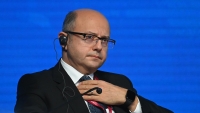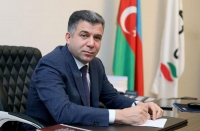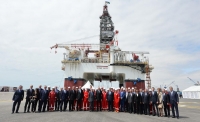Caspian Energy (CE): Your Excellency, which implications for the EU’s economy do you expect after Great Britain leaves the EU? How will it affect the investment climate of the economic space of the EU and Balkan states in particular?
Boyko Borissov, Prime Minister of the Republic of Bulgaria: The United Kingdom will remain an important trading partner for us after Brexit. According to the official data by the European Commission, the UK accounts for 15.5% of the exports and 10.3% of the imports of the EU-27[1]. On the other hand the EU will be by far the most important trading partner of the UK with 47.1% of the exports and 52.8% of the imports.
For this reason we are interested in concluding a Free Trade Agreement, which would not introduce trade tariffs or quotas between the EU and the UK. We should bear in mind, however, that no matter how ambitious the future economic partnership between the EU and the UK is, it cannot mirror the benefits of the Single Market.
Bulgaria is and will continue to be actively engaged in the Western Balkans and Brexit will not change that. The Sofia Declaration and Sofia Priority Agenda adopted during our Presidency of the Council of the EU in the first half of 2018 set forth the framework for continuous economic and investment cooperation with the six countries in the region. We remain committed to their implementation.
We hope to continue our cooperation with the UK in the region, including in the framework of the Berlin Process which Bulgaria co-chairs this year together with the Republic of North Macedonia.
CE: During your visit to Azerbaijan in 2018 you said that provision of gas supply in Bulgaria makes only 3%. Has the situation changed since then? Which companies are attracted for this purpose and what role can SOCAR play in energy security of the EU and the Balkan economic space? How is the economic relationship with neighbor countries progressing?
Boyko Borissov: Household gas supply to the country continues by far to fall short of the potential. Promotion of natural gas supply by the extension of the gas transmission infrastructure and by the negotiation of competitive prices is a top priority set in Bulgaria’s Energy Strategy. “Desiree” is a program with the Ministry of Energy for the gasification of households and is funded under the Kozloduy International Fund (KIF). Changes were introduced into the program in 2018 to increase the 20% grant to households to 30% of the eligible costs and the price of connection is covered 100% within the eligible costs. In mid-December, an additional sum of EUR 1.5 million was allocated to the program at the Assembly of Donors of the KIF. This increased interest in the program – as of 30 November 11,374 households applied for as against 3,636 households a year earlier. Projects were completed at 6,410 sites and households switched to natural gas.
To make natural gas an attractive alternative to other energy sources and to increase the gas “coverage” nationally it is crucial to achieve diversification of the sources and routes of gas supply. The Bulgarian Government works to complete Bulgaria’s interconnection with neighbor countries by building the needed infrastructure which will promote economic cooperation in the region. Undoubtedly, Azerbaijan is a key partner of Bulgaria for the achievement of this goal. Energy cooperation between our countries has reached a strategic level in recent years. I am confident that we will continue to build on our joint work to ensure Europe’s energy security.
The European Union’s objectives for carbon-free economy, reduction of hazardous emissions and boost of energy efficiency are an additional spur to substantial and sustainable growth of gas consumption across Bulgaria.
During my meeting with President Aliyev in March 2019 we discussed the possibility for the State Oil Company of the Azerbaijan Republic SOCAR to start investing in Bulgaria’s gas distribution system in the populated areas for two purposes: zero air pollution and competitiveness. I may say that this is an important joint project that we are currently implementing: the SOCAR investment in gas distribution in Bulgaria, i.e. in a predictable and rule-governed competitive market of an EU member state. SOCAR has hired an experienced international consulting company to conduct a feasibility study on the gas distribution market in Bulgaria. We expect that very soon our Azerbaijani partners will inform us about the official findings of the study and of their follow-up steps and actions. It is our expectation that the conclusions of the study will be positive and, accordingly, it is our hope that SOCAR will start investing in gas distribution in Bulgaria as soon as possible.
Moreover, the Interconnector Greece-Bulgaria (IGB) is expected to be completed by the end of this year to become an integral part of the Southern Gas Corridor (SGS). The IGB will supply our country with the negotiated 1 billion cubic meters/year of Azerbaijani natural gas from Stage 2 of the Shah Deniz Gas Field. We believe that the supply of natural gas from different sources and via different routes will guarantee competitive prices which will be a factor to promote household consumption.
CE: At the World Energy Congress hosted in Istanbul in 2017, you said that Bulgaria possesses the biggest transit capacities and gas compressor stations in the Balkans. Which advantages does Bulgaria get from it? Do you plan to build new Balkan gas storages or hubs for spot gas trade in the Balkans and Bulgaria in particular?
Boyko Borissov: Bulgaria’s strategic geographic location, well developed existing gas transmission and gas storage infrastructure, interconnection projects under construction with Turkey, Greece and Serbia and the completed interconnector with Romania are some of the factors that enable our country to keep its major role on the gas map of Europe. Further, it is a fact that 80% of the compressor stations in the region are located in Bulgaria and that the operation of the gas exchange starts. We work consistently to ensure that Bulgaria continues to be the natural route of the gas streams from North to South and from South to North alike.
When we talk about the Bulgarian Government’s concept of the Balkan gas hub on Bulgarian soil, we should also mention the role of the Underground Gas Storage (UGS) in Chiren. Currently it is seen mainly as a gas storage facility of local importance and a major tool to cover the seasonal fluctuation in natural gas consumption and supply to the country and to guarantee security of supply. The current storage capacity is 550 million cubic meters of natural gas. The withdrawal capacity, depending on various factors, ranges from 0.5 million cubic meters per day to 3.82 million cubic meters per day. There is future to expand and transform it into a commercial undertaking with an essential role in the development of competition and in the enhancement of the benefits for natural gas consumers in a single integrated and interconnected regional gas market.
To that effect Bulgartansgaz EAD is developing a project to increase the storage, withdrawal and injection capacity of UGS Chiren. The project plans for an increase of the working gas volume up to 1 billion cubic meters and of the output of the withdrawal and injection up to 8–10 million cubic meters per day. The project is rated as a project of “common interest” for the European Union. The project is expected to go into operation in 2025.
Early this year, following a Council of Ministers decision Bulgartransgaz EAD will acquire 20% of the share capital of Gaztrade S.A. – a special purpose vehicle (SPV) for the LNG terminal near Alexandroupolis, in the north of Greece. Our contribution to the project of a new LNG terminal in Greece is incorporated into the update Energy of Bulgaria until 2020. This is yet another significant step in the implementation of the overall concept of the Balkan hub. The concept envisages to install and develop the required gas transmission infrastructure to connect the natural gas markets of the member countries in Central and Eastern Europe. The materialization of the concept is needed for the promotion of a transparent, liquid and reliable natural gas market in Bulgaria and in the region.
CE: Do you find a pre-emerging of the free gas market and gradual untying of prices from oil quotations advantageous for Bulgaria and the EU in general?
Boyko Borissov: Our concept of a gas hub to operate in Bulgaria essentially comprises two components. First, it is the infrastructure under construction and second, the operation of the gas exchange. The start of the natural gas market liberalization is a major phase in the development of the energy sector in Bulgaria.
The operation of the gas exchange will guarantee that the national gas market will open which will be of benefit to all market actors. For this to materialize, liquidity and natural gas market liberalization are required both for Bulgaria and for Southeast Europe. Last year’s amendments to the Energy Act provide for a program of sales of definite annual amounts of gas on the exchange by the public provider Bulgargas EAD and end customers. This ensures a competitive environment where more opportunities and competitive prices for households and businesses are created.
In early 2019 Bulgartransgaz registered a subsidiary, Gas Hub Balkan EAD. The company operates trading platforms for the needs of the natural gas markets within the Gas Hub Balkan.
CE: Could you please tell about the way the Bulgarian economy has been embedded into the single economic structure of the EU? In which sectors has the cooperation been established and which projects of common interest will be implemented?
Boyko Borissov: Upon its accession to the European Union on 1 January 2007, Bulgaria became part of a community of countries with a population of 500 million, which makes the Union the world’s largest single market and puts it at the forefront of trade and foreign investment globally.
Bulgaria’s full EU membership has helped our country maintain macroeconomic and financial stability in recent years and, in addition, take proactive measures to improve the business environment and to boost the GDP. Over the period since EU accession, our total volume of trade has gone up by 50%. Bulgarian exports have almost doubled and Bulgarian imports have marked 90% increase. It is extremely important to note that Bulgaria ranks among the leaders in financial stability and credit rating in the region of Eastern Europe.
The Bulgarian economy is part of the EU economy and of the Union’s common market. Cooperation is maintained in all sectors across the EU and multiple investments were made in Bulgaria after its accession to the EU. Within the framework and with EU co-financing Bulgaria and the region of Southeast Europe saw the implementation of many projects in the Bulgarian industry, agriculture, transport, environment, energy and other sectors. Support is offered to enable the implementation of joint infrastructure projects of common European interest in the fields of energy, transport and other sectors.
Power grid and gas interconnectors of Bulgaria with the neighbor countries of the region of Southeast Europe materialize with EU support: the Interconnector Greece-Bulgaria is one of the Commission’s seven top priority projects to transport natural gas from the Shah Deniz 2 Gas Field; the modernization and rehabilitation of the Bulgarian gas transmission infrastructure; the Interconnector Bulgaria-Serbia. The implementation of projects of strategic importance in the field of electricity infrastructure is in progress. The construction of the new 400 kV internal power line between Maritsa East and Bourgas started on 15 May 2019. It is one of the five projects of common European interest that the Electricity System Operator EAD implements under the regulation for the development of the trans-European energy infrastructures. The other four projects are: the transmission of electricity from Maritsa East Substation, Bulgaria, to Nea Santa Substation, Greece; and the internal 40 kV power lines between Maritsa East Substation and Plovdiv Substation, between Maritsa East Substation and TPP Maritsa East 3 and between Varna Substation and Bourgas Substation.
The implementation of all these projects will guarantee the security of energy supply to the region and will generate better financial and economic conditions for consumers, both households and businesses. Accordingly, the economies of the countries in our region will become more competitive.
CE: Why should Bulgaria build a nuclear power plant in Belene when the construction of two additional gas pipelines (Southern Gas Corridor and TurkStream) is practically complete?
Boyko Borissov: In the last few years, the European Commission’s policy has been focused on the sustainable transition to low-emissions energy. The development of nuclear energy in strict compliance with international safety standards is a priority for the Bulgarian Government. We view this prospective option as a matter of energy and national security. Nuclear energy is also an excellent way to meet the challenges of climate change – it is a zero-emissions industry that fully meets today’s environmental requirements.
Bulgaria has more than 45 years of experience in the field of nuclear energy; we are successfully operating our first nuclear power plant, Kozloduy NPP, in strict compliance with the highest international safety standards and criteria. We have extremely well trained specialists in the industry. The nuclear power plant supplies approximately 34% of the country’s energy at affordable prices at that. In addition, we have two Generation III+ reactors that are stored in Bulgaria. Our goal is to use the available equipment, the licensed site and the EU-approved project.
These were the reasons for which on 7 June 2018 Bulgaria’s National Assembly decided to restart the exploration of opportunities for construction of Belene NPP. The bidders – Rosatom which is the designer of the equipment, the China National Nuclear Corporation (CNNC), the Korea Hydro & Nuclear Power, the French Framatome, the US General Electric – give us optimism that the procedure will be completed successfully. It is our plan that the Bulgarian Government will play with all tangible and intangible assets that have bearing on the project and will keep a blocking quota in the future special purpose vehicle. The committee to select a strategic investor produced the shortlist at yearend 2019 and is currently sending letters to the shortlisted bidders to invite them to submit binding offers.
It is important to note that the supplies of natural gas from different sources are expected to generate prerequisites for private investment, such as combined cycle power plants.
CE: What is your opinion about the western EU countries’ policy on abandoning nuclear fuel in the medium and long term?
Boyko Borissov: It is the right of every country to determine its own energy mix. What is important is that EU law is respected and that we all work together for our common carbon-neutral future. This guarantees the success and efficiency of the measures and policies implemented. This is at the core of our national view that has been consistently upheld over the years.
CE: How do you see the economic cooperation with Azerbaijan, Georgia and Turkey after the construction of the Baku-Tbilisi-Kars railway?
Boyko Borissov: The Baku-Tbilisi-Kars railway is part of the New Silk Road and aims at continuous freight traffic from Beijing to Brussels. It is expected to take 15 days less to move from China to Europe when compared to the alternative route via Russia and it is more than twice faster when compared to the existing sea route while the costs are below the half of the air service charges.
Azerbaijan, Georgia and Turkey are Bulgaria’s important trading partners. The major trade between Bulgaria and these three partners is still handled by the existing Black Sea ferry links or else road transport.
The Baku-Tbilisi-Kars railway will increase the capacity of the transport networks between Bulgaria and Europe on the one hand, and the South Caucasus region and Asia on the other hand. The diversification of logistics flows will help reduce the economic actors’ transportation costs. Together with the Baku-Tbilisi-Ceyhan oil pipeline and the Baku-Tbilisi-Erzurum gas pipeline the Baku-Tbilisi-Kars railway makes the South Caucasus and Turkey a key transport corridor between Europe and Asia.
CE: What are the prospects of the goods turnover between the Balkans and these three countries? What hinders to establish an efficient investment and free trade space between these two regions?
Boyko Borissov: As an EU member state Bulgaria supports the Eastern Partnership which aims to strengthen the political association and economic integration of six East European and South Caucasian partner states, among them Azerbaijan and Georgia. While a customs union exists between the EU and Turkey to allow duty-free trade, negotiations with Azerbaijan opened in 2017 on a new agreement on a deep and comprehensive free trade area. An Association Agreement/Deep and Comprehensive Free Trade Area (AA/DCFTA) with Georgia went into effect in 2014, bringing to a new level the relations between the EU and the EU member states on the one side and Georgia on the other side. As a full member of the European Union Bulgaria strictly observes the EU Common Commercial Policy and the Customs Union regulations.
Promising areas and sectors that hold potential for increased trade and investment are: information and communication technologies (ICTs), tourism, digitalization of trade, mechanical engineering (machines, equipment and parts thereof), electronics, electrical engineering, automotive, textile and knitwear industry, foods and beverages, innovations.
There exists potential to expand company-to-company cooperation, promote collaboration and accept Bulgarian companies into the network of suppliers and sub-suppliers including in sectors of mutual interest such as the manufacturing of machines, equipment and parts for them, electronics, electrical engineering and automotive industry.
There is a pronounced interest in the fields of agriculture and forestry. Bulgaria has extensive experience in agri-processing, food additives, veterinary products and medicines, including vaccines for animals.
CE: How is the construction of the highway with Greece progressing? What role will this route play in the trade turnover of the EU in general?
Boyko Borissov: The completion of the Strouma Motorway is a major priority of the Bulgarian Government in view of its strategic national, regional and European importance. Strouma Motorway is part of the “Orient/East-Med” Corridor of the main Trans-European Transport Network (TEN-T) and the busiest north-south route via Bulgaria. The motorway is part of the European Union’s Priority Project 7 including the motorway axis Igoumenitsa/Patras–Athens–Sofia–Budapest. The axis is used as the shortest distance between Western Europe, Central Europe and the Aegean Sea and also between Europe and Asia. Strouma Motorway is about 150 km long of which approximately 93 km are open to traffic. The rest of the stretch is under construction or is being prepared for works.
The motorway runs along the river Strouma and goes via scenic localities such as the Kresna Gorge. This part of the motorway runs across an area that is of environmental concern and that is a setting of intensive advance earthworks. A series of measures will be taken in this section in 2020 to mitigate the impacts by the existing Motorway E-79 on sites of the Natura 2000, the European network of nature protection areas in the territory of the European Union.
The thorough completion of the motorway will significantly improve the road network in Southeast Europe and will generate conditions conducive to enhanced cooperation, trade in goods and services and the launch of new business projects between the countries in the southern part of the Balkans.
CE: What is the impact of the expansion of the Chinese tied-credits related capital on the economy of Bulgaria and the whole region? To what degree is the investment climate of Bulgaria attractive for the local and foreign investors today?
Boyko Borissov: In recent years, Bulgaria has become a leading destination that attracts investment to the region owing to its taxation, combined with the availability of skilled labor and the lowest operating costs in Europe.
We witness a considerably rising interest in Bulgaria as an investment destination in both, manufacturing and high value added business services. Due to the investment-friendly conditions that are offered and the long-term political and macroeconomic stability, our country has attracted a large number of largescale projects in the automotive industry, the ITs and outsourcing.
Currently, with the Bulgarian Development Bank as a party we have three operating agreements with Chinese financial institutions. The third one was signed when China’s Premier visited our country in late 2018; it is a 10-year agreement with a two-year grace period and is the first payment of negotiated financing under a Framework Agreement worth 1.5 billion euro. The projects funded are mainly small and medium enterprises (SMEs) in sectors such as transport, logistics, tourism, renewable electricity generation, infrastructure, agriculture, food processing and other. The Chinese component in the projects may be seen in the form of Chinese imports or the use of Chinese equipment or Chinese support to Bulgarian companies that export to China.
CE: How do you see the role of Bulgaria in shift to renewable sources of energy? To what extent this type of energy is competitive on the Bulgarian market and the market of the Balkan states?
Boyko Borissov: Bulgaria’s national policy to promote the use of energy from renewable sources is in line with the objectives and priorities of the European Union’s energy policy and with the commitments made under international agreements to which Bulgaria is a party. This policy takes into account the condition and development of the sector and socio-economic and environmental aspects.
In 2014 Bulgaria exceeded the national mandatory renewable energy target of 16% in the gross ultimate energy consumption for 2020. In 2012-2018, the country reported continuing growth and over-performance in the national target set for 2020, which reached 20.5%.
The adoption of the documents of the non-legislative initiative Clean Energy for All Europeans Package in yearend 2018 set a new regulatory frame to formulate the EU’s energy and climate policy till 2030, with a time horizon 2050.
To meet the new requirements Bulgaria has prepared and will submit to the Commission a draft integrated national plan in the field of energy and climate in the period 2021-2030 and in the next ten-year periods between 2030 and 2050.
The policies and measures in the plan build on the scope and substance of those that currently exist, with a view to broader deployment and better integration of renewable energy in the achievement of the main benchmarks for affordable, safe, competitive, secure and sustainable energy system.
For the reason of the higher investment costs for the generation of electricity from renewable sources, the price of renewable energy is higher than the price fluctuations on the market. Hence the support in the form of preferential prices and premiums. In recent years, with the advanced and cheaper technologies this support has been shrinking more and more. An increasing proportion of electricity from renewable sources is traded on the organized exchange. In the future, given the rapid development of renewable electricity generation technologies, investment costs are expected to decrease and the prices of such energy are expected to gradually become competitive with the price of electricity from conventional sources. There are already indications of interest in the implementation of investment projects whose electricity should be traded at absolutely market prices.










